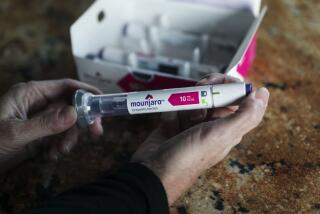Diuretics Effective in Fighting Heart Disease, Research Finds
- Share via
Inexpensive diuretics are more effective than newer, more expensive hypertension drugs in preventing deaths from heart disease, and using the old-fashioned “water pills” more widely could save 60,000 lives and hundreds of millions of dollars per year, according to the first head-to-head comparison of the drugs.
Diuretics, which ease the load on the heart by forcing the body to excrete excess water and sodium, should be the first choice of drugs for physicians treating the estimated 50 million Americans with hypertension, researchers said, and patients already receiving other drugs should have diuretics added to their regimens.
The other hypertension drugs, which include calcium channel blockers such as amlodipine (sold under the brand name Norvasc) and angiotensin-converting enzyme (ACE) inhibitors such as lisinopril (Zestril and Prinivil), had previously been shown to be more effective than placebos, but they had never been tested against diuretics.
“Yet these more costly medications were often promoted as having advantages over older drugs,” said Dr. Claude Lenfant, director of the National Heart Lung and Blood Institute. “Now, at last, we can make those needed comparisons and know which blood-pressure drug to use to begin therapy,” said Lenfant, whose institute sponsored the study.
“Quite simply, this is one of the most important trials of antihypertensive drug therapy,” said Dr. Lawrence J. Appel of Johns Hopkins University.
The study, published today in the Journal of the American Medical Assn., did not look at some even newer drugs, however, and did not consider the effects of combinations of drugs.
Diuretics were once the main course of treatment for hypertension until other drugs were developed. In 1982, they were prescribed to 56% of patients receiving treatment for high blood pressure.
But only a decade later, that proportion had fallen to 27%. Fully two-thirds of the $15 billion spent each year on blood-pressure drugs now goes to calcium channel blockers and ACE inhibitors, experts said.
Norvasc, produced by Pfizer Inc., is the best-selling brand-name hypertension drug in the world, with sales of more than $3.5 billion each year. It costs patients between $1.40 and $1.60 per day. The most widely used diuretics, in contrast, cost about 6 to 10 cents per day. Had patients stuck with diuretics between 1982 and 1992, Lenfant said, they and their insurers would have saved $3.1 billion.
Experts cautioned that patients taking other drugs should not stop, but should consult with their physicians about switching to diuretics or adding them to their regimens.
Many patients will require the use of more than one drug to keep their blood pressure under control, said Dr. L. Julian Haywood of USC, and some patients are not good candidates for diuretics -- such as those with kidney problems and electrolyte or fluid imbalances.
The eight-year trial, known by the acronym ALLHAT, enrolled 33,357 patients 55 years or older who had high blood pressure and at least one other risk factor for heart disease, such as diabetes, smoking and high cholesterol levels. The patients were divided into four groups who were randomly assigned to receive either a diuretic (chlorthalidone), a calcium channel blocker (amlodipine), an ACE inhibitor (lisinopril) or another group of hypertension drugs called alpha-adrenergic blockers (doxazosin).
The alpha-adrenergic blocker part of the study was halted more than two years ago because patients receiving it did significantly worse than those receiving the other drugs.
After an average of about five years of follow-up, the team found that patients receiving amlodipine had a 38% higher risk of developing heart failure and a 35% higher risk of being hospitalized than those receiving chlorthalidone.
Those taking lisinopril had a 15% higher risk of stroke (40% higher in African Americans), a 19% higher risk of developing heart failure and an 11% higher risk of being hospitalized or treated for angina (chest pain).
“The take-home message is that doctors should begin drug treatment for high blood pressure with a diuretic,” said Dr. Paul Whelton of Tulane University.
Shares of Norvasc maker Pfizer dropped 57 cents to close at $30.48 in trading on the New York Stock Exchange.
A separate arm of the ALLHAT study involving another 10,355 patients compared the cholesterol-lowering drug pravastatin to a group receiving what researchers called “usual care” -- exercise and a change in diet. After five years of follow-up, the team concluded that the two groups had similar death rates from heart disease.
But experts such as Dr. Richard C. Pasternak of Massachusetts General Hospital questioned the findings. He noted that, by the end of the follow-up period, 30% of the patients in the treatment group had stopped taking their pravastatin, and nearly 30% of the patients in the usual-care group were taking it or a similar statin because they were unable to control their cholesterol levels otherwise.
These findings “should be examined more closely,” because the failure of patients to adhere to their regimens muddied the results, said Dr. Robert Bonow, president of the American Heart Assn.






